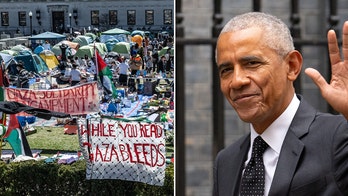With Libyan dictator Muammar al-Qaddafi bracing his country for civil war and threatening to turn the North African nation into "red fire," senior Obama administration officials agree the dictator is "in the bunker," but disagree sharply over whether Qaddafi is detached from reality.
"Obviously, we all know he's nuts," said one U.S. official, speaking on condition of anonymity to offer his frank assessment of Qaddafi's mental state. "And just as obviously, no one is going to say that publicly."
While admittedly non-clinical, the view that Qaddafi is "nuts" is widely shared, if not pervasive, within American policymaking and scholarly circles. The official spoke on the very day the State Department closed the U.S. Embassy in Tripoli, a move that reflected growing U.S. uncertainty about what Qaddafi might do next.
The belief that Qaddafi is insane, a non-rational actor striding the world stage, is of course not new. It became conventional wisdom with the erratic appearance and conduct of Qaddafi himself over the years: the bizarre costumes, the dazed and confused manner, the aspirations to grandeur, messages that were both cryptic and apocalyptic.
In 1986, President Ronald Reagan, promising retribution for a Libyan bomb plot that killed two American servicemen in a Berlin disco, reinforced the idea of Qaddafi as a deranged man by calling him the "mad dog of the Middle East."
But another senior U.S. official argued precisely the opposite.
"We don't know that he's insane," stressed this source, also requesting anonymity to speak freely. "Anyone who survives 40 years of the tribal scene in Libya has the ability to assess things in a canny way. He's cunning. He's capable of making rational decisions. He made one in 2003."
This was a reference to Qaddafi's decision, in the wake of the U.S.-led invasion of Iraq, to dismantle his weapons of mass destruction programs, a reversal of course that would in turn lead to normalized relations with the United States.
While believing Qaddafi to be rational actor, the second official also recognized that the dictator has now, with aerial attacks on his own citizens and estimates of casualties ranging in the thousands, crossed into uncharted territory.
"When a guy is in the bunker -- and he's in the bunker -- you can't know what decisions they're going to make," this official said. "Nobody could bank on what he would do."
At the same time, this official intimated that a message has privately been conveyed to Qaddafi, alerting him that the right actions now could potentially spare him death or imprisonment for war crimes.
"He has options," the official said. "And he knows he has options." Asked if Qaddafi could receive asylum in another state, the source repeated: "He's got options he knows he can take."
One measure of the Obama administration's wariness of Qaddafi and his unpredictability was the remarkably cautious tone used by senior U.S. officials, including the president, when discussing the crisis in public. For a time, they even avoided using Qaddafi's name.
Asked directly in a news briefing last Thursday whether the U.S. believes Qaddafi to be a rational actor, Assistant Secretary of State P.J. Crowley gave a 233-word answer in which he pointedly never said yes or no.
"It's not for me to characterize whether they are seeing this situation properly or not," Crowley said dryly of Libya's leadership.
"We didn't want to jeopardize getting our people out of Libya," said one U.S. official privately.
On Friday, after the last U.S. Embassy staff had safely been spirited out of the country, the U.S. imposed unilateral sanctions on Libya. On Saturday, President Obama began openly calling on Qaddafi to resign. Still, the president did not use Qaddafi's name, and issued his challenge off-camera, through the rather muted form of a brief paper statement summarizing his telephone conversation with German Chancellor Angela Merkel.
"The president stated that when a leader's only means of staying in power is to use mass violence against his own people, he has lost the legitimacy to rule and needs to do what is right for his country by leaving now," the White House statement said.
Former White House Press Secretary Dana Perino, who served under President George W. Bush and is now a Fox News contributor, agreed that the readout of a high-level telephone call represented an unusual forum in which for an American president to demand the resignation of another world leader.
She attributed the strange format to ongoing concerns among U.S. policymakers about Qaddafi's state of mind.
"They are not wanting to feed the instability by inciting Qaddafi further," Perino said. "Perhaps they felt the best way to deliver the message was indirectly, which leaves some scratching their heads but in the long run probably doesn't matter that much."
In the short run, most analysts agree the rhetoric from Obama and his national security team must now be aimed at persuading key lieutenants of Qaddafi's to defect from him. One individual whom U.S. officials appear eager to cultivate for the role is Foreign Minister Musa Kusa.
Though long suspect in Washington for his commplicity in Qaddafi's crimes, Kusa has held talks with numerous U.S. officials during the Libyan revolution. Most recent was Undersecretary of State Bill Burns, who thanked Kusa for his cooperation in last week's evacuation of American citizens. Officials note Kusa was educated in the United States, and has long projected more pragmatic rationality than Qaddafi.
"(Kusa) understands," said a State Department official, "the environment in which they're operating."
When White House Press Secretary Jay Carney vowed last week that the Obama administration was "utilizing the full extent of its intelligence capabilities to monitor the Qaddafi regime's actions," the declaration appeared intended to influence the internal calculations of Qaddafi's remaining loyalists.
Among the "intelligence capabilities" at the president's disposal is a group of "profilers" at the Central Intelligence Agency, whose job it is to compile psychological profiles of foreign heads of state. Their models are designed to help U.S. policymakers more accurately predict world leaders' behavior, and juggle American assets accordingly.
Among the foremost practitioners of this kind of analysis is Dr. Jerrold Post, a two-decade veteran of the Central Intelligence Agency who is now director of George Washington University's Political Psychology Program.
"Often, but not always," Post replied when asked, during a telephone interview with Fox News, if he believes Qaddafi is sane. A trained psychiatrist, Post said of the Libyan dictator: "He has a borderline personality. He's usually above the border, in touch with reality, dealing with things realistically.
"But under stress, he goes below the border, becomes almost delusional at times. It's inconceivable to him to believe that the people of Libya, who must adore and love him, don't. ... He considers himself and Libya one and indivisible."
Post said Qaddafi appears now to have entered a "siege state," and will likely indulge his underdog's instinct to fight to the last.
"He believes it takes strength to be challenging the authorities, the establishment. That's how he came to power," Post said. "That was why he supported terrorist groups, even when it was of no particular benefit to Libya, such as his support for the IRA or the FARC in Colombia. He was championing the underdog.
"But it is important to remember that underneath these buffoonish antics, he is an extremely dangerous man ... particularly when besieged," Post said, "I don't see this man slinking away in the middle of the night."
Author of "Leaders and Their Followers in a Dangerous World: The Psychology of Political Behavior" (2004) and "The Mind of a Terrorist: The Psychology of Terrorism from the IRA to al-Qaeda" (2007), Post discounted suicide as a path for Qaddafi, saying the prospect is "not impossible but highly unlikely."
"He's gonna go down with his boots on," said Post. "He's staked so much on standing up to the outside adversary. ... He speaks of fighting to his last drop of blood, without respect to all the blood of others he has spilled."




